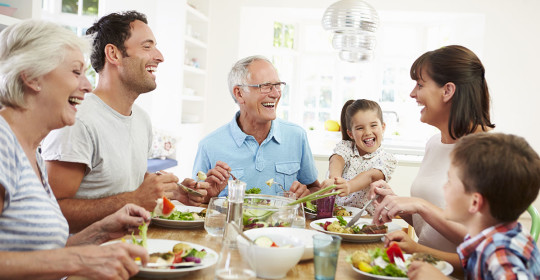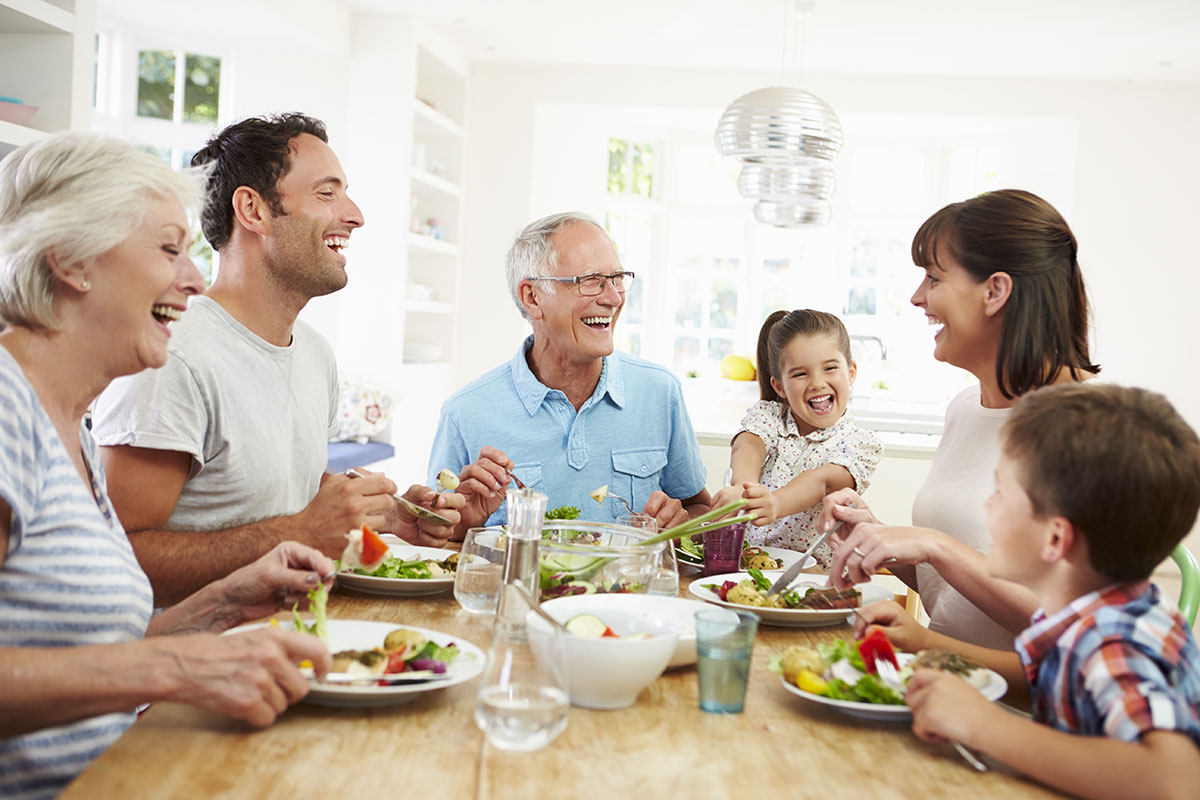
Protect Your Family from Food Poisoning

Food poisoning (or foodborne illness) happens when you get sick from eating or drinking something that has harmful germs in it – like bacteria, viruses, or parasites. Two common causes of food poisoning are E. coli and Salmonella.
Following good habits like these can help protect you and your family from food poisoning:
- Buy food from stores that look and smell clean.
- Don’t buy food past “sell by,” “use by,” or other expiration dates.
- Wash your hands often with warm water and soap – especially before and after touching food.
- Make sure food is cooked to a safe temperature.
- Keep raw meat and seafood away from cooked and ready-to-eat food.
- Keep cold foods cold and hot foods hot. This helps prevent bacteria from growing.
What causes food poisoning?
You can get food poisoning from eating bad (contaminated) food. Bacteria are the most common cause of food poisoning. Bacteria can get into food in many ways.
- Foods may have some bacteria on them when you buy them.
- Raw meat, poultry (like chicken and turkey), fish, vegetables, and fruit may pick up bacteria where they are grown or packaged.
- Foods can also pick up bacteria at the store or in the kitchen. This usually happens when food that needs to be kept cold is left out at room temperature for more than 2 hours.
How do I know if I have food poisoning?
Some signs of food poisoning include:
- Stomach cramps
- Vomiting (throwing up)
- Diarrhea (frequent, watery poop)
- Fever
- Headache
- Body aches
Signs of food poisoning can start hours or even days after eating bad food. Usually the effects only last for 1 or 2 days, but they may last up to 2 weeks.
The treatment for most cases of food poisoning is to drink lots of fluids, like water. For a more serious illness, you may need treatment at a hospital.
When do I need to see a doctor?
Get medical help right away if you:
- Are throwing up many times a day for more than 2 days
- Can’t drink or keep down any liquids for 24 hours
- Have blood in your vomit or stools (poop)
- Have a fever higher than 101.5 °F (degrees Fahrenheit)
- Have extreme pain or cramping in your stomach
- Are feeling very weak, dizzy, or lightheaded
Who needs to be concerned about food poisoning?
Anyone can get sick from eating bad food. But food poisoning is a serious health risk for some people.
Get tips on food safety for:
- Pregnant women
- Babies
- Young children
- Older adults
- People with certain health conditions (including AIDS, diabetes, and cancer)
Shop smart when you buy food.
Shop at stores that look and smell clean. A dirty store or a bad smell can be a sign that food hasn’t been stored safely.
Follow these other safety tips when you choose food at the store:
- Check the expiration (“use by” or “sell by”) dates on everything you buy.
- Don’t buy cans that are leaking, bulging, rusty, or badly dented.
- Don’t buy bottles or jars with “popped” lids or broken seals.
- Make sure frozen food packages aren’t open or crushed.
- Buy eggs that have been kept in the store’s refrigerated section. Make sure they are free of cracks and liquid.
- Put meat, fish, and poultry (like chicken and turkey) in plastic bags – or separate them from other food in your shopping cart. This will keep them from dripping onto your other food.
Make sure frozen food stays frozen.
- Shop for frozen foods last so they are less likely to thaw before you get them home.
- Avoid packages with frost or ice crystals – these are signs that the food became warm and then refroze.
Plan ahead to get food home safely.
Put cold foods into a refrigerator or freezer as soon as possible.
To keep cold foods safe, follow these tips:
- Put cold food in the refrigerator within 2 hours. If it’s a hot day – over 90 °F (degrees Fahrenheit) – refrigerate cold foods within 1 hour.
- If you have other errands to do, save food shopping for last.
- If you live far from the store, pack a cooler with ice for your cold items.
- If it’s a hot day and you have the air conditioning on in your car, keep groceries in the passenger area instead of the trunk. This will help keep them cool.
- Put cold foods in the refrigerator or freezer as soon as you get home.
Protect yourself from food poisoning at home.
After you get your groceries home and stored away safely, use the following tips to help prevent food poisoning.
Keep your hands clean.
Wash your hands often with warm water and soap, especially:
- Before and after handling food
- After using the bathroom
- After changing a diaper
- After touching pets
Wash your utensils.
Make sure to wash cutting boards, dishes, utensils (like knives and spoons), and counters with hot, soapy water after preparing each food item.
Separate raw meat, poultry, and seafood from ready-to-eat foods.
Use one cutting board for raw meat, poultry, and seafood and another one for fresh foods (like vegetables and fruits). If you have only one cutting board, wash it with hot soapy water after you prepare each type of food.
Place cooked food on a clean plate. Don’t use a plate that had raw or uncooked food on it – especially raw meat, poultry, or seafood.
Prepare food safely.
Wash all fruits and vegetables under running water, even if you plan to cut or peel them.
Make sure food is safely cooked.
You can’t tell if meat, poultry, and eggs are cooked just by looking at them.
The only way to be sure food is cooked safely is to use a food thermometer. A food thermometer checks the temperature inside the food to make sure the food is safe to eat.
- Find out how to use a food thermometer.
- Print this chart of the recommended cooking temperatures for foods [PDF – 3 MB] and put it on your refrigerator.
Keep cold foods cold.
Refrigerate or freeze all food that can go bad if it’s left at room temperature (like meat, poultry, seafood, eggs, and open jars of mayonnaise).
Check the settings on your refrigerator and freezer. Set the temperatures to:
- 40 °F or below for the refrigerator
- 0 °F or below for the freezer
Keep appliance thermometers in the refrigerator and freezer to make sure they are staying at the correct temperatures.
Throw away food that’s been left at room temperature for more than 2 hours. If it’s a hot day (over 90 °F), throw away food left out for more than 1 hour.
Use foods that need to be kept in the refrigerator (dairy, meat, poultry, seafood, fruits, and vegetables) before they spoil and are unsafe to eat. Find out how long foods can be stored in the refrigerator or freezer.
Stay safe from food poisoning when you eat out.
These tips can help you enjoy healthy, safe meals away from home.
- See if a restaurant looks clean before you even sit down. If the restaurant doesn’t look and smell clean, eat somewhere else.
- Order your food fully cooked (well-done), especially if it’s meat, poultry, fish, or eggs. Cooking kills germs.
- To be safe, hot food needs to be served hot, and cold food needs to be served cold. Send back your dish if it’s the wrong temperature.
Source: Offices of Disease Prevention and Health Promotion
More Information:
- US Department of Health & Human Services Blog about Food Safety: http://www.foodsafety.gov/blog/index.html


Most Commented